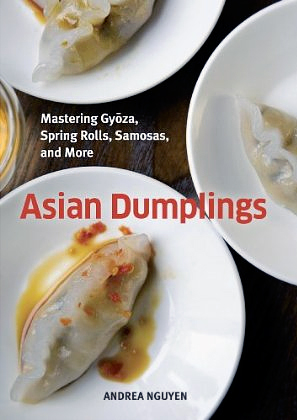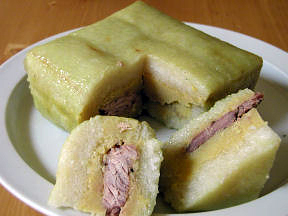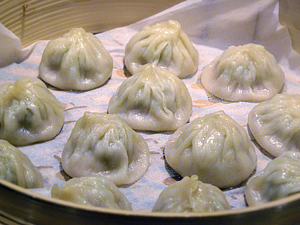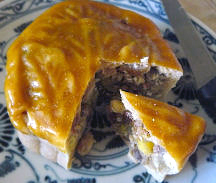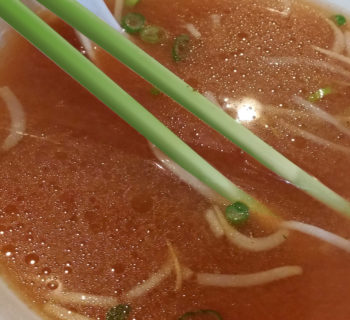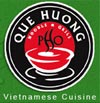I was happy and honored that Andrea Nguyen agreed to an interview. This gives me a great chance to pick her brain and learn what makes her tick. Between writing for well-known publications, teaching classes, giving live tours, demos and interviews, and writing best selling books, Andrea Nguyen is the go-to sources for all things Viet cuisine and Viet pho.
Many searching for advice on Viet cuisine undoubtedly have heard of Andrea Nguyen. She is a celebrated food writer and teacher with a unique ability to interpret traditional Asian cooking styles for modern cooks. Her work appears in the Los Angeles Times, San Jose Mercury News, and Saveur magazine, where she is also a contributing editor. Andrea’s first book, Into the Vietnamese Kitchen, received three prestigious James Beard and IACP cookbook award nominations. Her new cookbook, Asian Dumplings, hits the shelves on August 25th, 2009.
With her very popular website VietWorldKitchen.com, a new book and its companion website Asiandumplingtips.com, Andrea is more than busy. Her new book Asian Dumplings is now available everywhere. You can also buy Asian Dumplings on Amazon.com. So let's get to the Q&As. As usual I add my own comments in the brackets [...] to clarify or explain as needed.
LovingPho (LP): What are some of your favorite Vietnamese dishes, either to make or to just enjoy them being made by others?
Andrea Nguyen (AN): Pho noodle soup and any kho dish simmered in caramel sauce!
["Kho" dishes are normally pork or fish simmered in caramel sauce in a claypot. They're great over just white rice! See her own example of fish kho.]
LP: What are some of your favorite non-Viet dishes? And why?
AN: Good wonton noodle soup because the textures are so alluring. A juicy hamburger on a homemade bun with hot, crisp French fries because I love practically anything that's grilled or deep fried.
LP: What do you consider as some of your proudest accomplishments (food related or otherwise,) both in recent years and of all time?
AN: Having Into the Vietnamese Kitchen published and knowing that people are using the book to make food at home. Also, having my mom say that she cooks from the book.
LP: People can read about how you started your culinary career from your own blog and many interviews you have given. What happened was you ended up abandoning your "professional career" to pursue cooking. It's a classic case of triumph of passion. But were there times in the early years that you ever felt a food career could be a mistake, or did your passion keep you going regardless?
AN: Life is a strange thing and I kept my eyes on the prize. I couldn't get a book deal for years, though people in the higher echelons encouraged me to get my name out there. Knowing that people you value value your work fueled my tenacity.
LP: Do you have a funny story of failure during those years that you'd like to share?
AN: Writing is a learning process. It's quite organic. I found out that I'd been making rice wrong for decades. My mother set me right and now 98% of my pots of rice turn out perfect. Practice and constant discovery is key.
LP: The food industry is as wide ranging and diverse as any other big industries. Did you have some kind of plan in mind or just wing it? I see your passion in your work now and would like to know what it took for you to finally found your niche.
AN: I thought I'd cook but that was such hard work. I'm an academic geek who is into educating people about new flavors and ideas. You can be creative nowadays with your career. I started out in banking but those skills I now use to figure out business opportunities, contracts, etc. I kind of have a plan and see where life takes me. My folks taught me to always have a backup plan. It's the immigrant/refugee thing, you know? If this writing/food career doesn't work out, I bag groceries quite well at Trader Joe's.
LP: Recipes are essentially detailed instructions to make something. In your views, are recipes really the pinnacle of what humans can achieve to share and teach, or do you see even better ways to share and teach about food?
AN: Recipes are like performance art pieces for me. I do them over multiple times to communicate enough details to help home cooks. I'm a professional home cook and through recipe books, I like to offer a cultural and historical understanding of food and flavor. I learned cooking by reading and practicing on my own and encourage others to do that too. However, we don't all learn the same way so cooking classes and demonstrations, particularly of difficult techniques, are always welcomed.
LP: How often do you deviate from your own recipes and why?
AN: I love to test out my own recipes to sort of test myself. It's often a mistake and I find myself saying, "Darn, I should have listened to me!" If I seriously deviate, it's because I'm testing out a new idea or technique.
LP: Most everyone enjoys eating out. With your knowledge about foods and the culinary arts, how critical are you about the foods you order in restaurants?
AN: I'm a bit too critical but remind myself that eating out is entertainment, a time-saver, and opportunity for discovering new ideas.
LP: And do you feel such knowledge has increased or decreased the level of enjoyment you may get out of a restaurant meal?
AN: I like to eat out and learn something new. It can be as simple as having a bowl of filet mignon pho in a double layer metal bowl (go to El Monte in SoCal) and thinking about how that Korean vessel keeps the soup extra hot. Or, eating at Alinea in Chicago and savoring post-modern culinary dinner theater.
LP: Do you find yourself naturally becoming the focus for culinary discussions, and opinions, at the restaurant table?
AN: I have opinionated family and friends so it's normally a broad discussion of food, cooking, history, politics, etc. Food is a great lens for exploring human existence.
LP: When you enter an unfamiliar Viet restaurant, what food do you think about first? Do you think to yourself "I wonder how good pho is here?" or is it a different dish you're wondering about? Why?
AN: I look around and see what everyone is eating. If I'm in a pho joint, I take a big inhale to get a whiff of the broth. Sometimes you really get to smell the pho fragrance and that's a nice sign.
LP: I think you've been back to Vietnam a few times, and no doubt you had to visit the food markets there. Can you share with us what you can find in a Viet market there that you wish are available here in the states?
AN: Seafood like you wouldn't believe. Live rice paddy crabs that you'd use for bun rieu cua. Produce like fragrant hoa thien ly. Prepped ingredients like minced shallot, lemongrass, and chiles. Freshly grated coconut for coconut milk. You would be hard pressed to find that abroad.
LP: What are your views about the state of Viet cuisine in Vietnam? Whom do you feel are doing good things to advance Viet cuisine there?
AN: There are a number of locals like Mrs. Nguyen Dzoan Cam Van who are pushing things a bit in terms of modern Viet cuisine that retain its traditional foundations. Viet kieu (Viet expatriates) open places like Ngon to present Viet fare in pleasant surroundings. Foreigners such as Didier Corlou and Bobby Chinn meld eastern and western traditions.
LP: It's really a blessing (and interesting too) that pho is now one of the most recognizable Viet dish outside of Vietnam. What are your thoughts on this?
AN: I'm just hoping to get better bowls of pho in more places in the future! I'm selfish that way. Seriously, the popularity of pho in urban centers around the world reflects the maturation of the Viet-immigrant communities. People tell me about eating pho in the Czech Republics! How cool is that? Our peeps are everywhere. I've had Vietnamese food in the "new" section of Avignon, France, which dates back to medieval times. The Vietnamese restaurants are on side streets and one place used a dumb waiter system to bring the food to the dining room.
LP: Many people feel pho recipes are too complex and involved to try making themselves. What are some ingredients that you think pho can do without but still give acceptable results? Or is it all about authenticity and completeness?
AN: Vietnamese people often think it's too time consuming to make but I've had plenty of non-Viet people cook my pho recipe and prepare delectable bowls. One man took his homemade pho to some local Vietnamese nail salon gals and they loved it. The ladies responded by asking, "Is Into the Vietnamese Kitchen available in Vietnamese?" If you make pho once, you'll understand what goes into preparing a good bowl and appreciate both home and restaurant cooking. Plus, you can freeze pho broth.
LP: What are some ingredients that pho must absolutely have?
AN: Charred onion and ginger, good fish sauce, yellow rock sugar, and good beef marrow bones for beef pho.
LP: How do you feel about franchised foods in general and franchised pho in particular?
AN: Would love to see a good franchise abroad but what we have now is not consistently good. Pho is not close to becoming like McDonald's.
LP: Speaking of franchise, what are some of the Viet foods that you think will lend themselves well to being franchised foods? Is it the fried variety?
AN: Banh mi sandwiches can be like Subway but lots better.
LP: Back to pho franchises. Pho is popular in the U.S. for sure, but can the franchises co-exist with independent shops in Viet communities, or do they have to expand into more mainstream American markets while risking their own survival there?
AN: There's too much competition in the Viet communities for good pho shops. I'd go out into the mainstream.
LP: In your opinion, is there such thing as pho etiquette? If so what are some important pho etiquette?
AN: Taste the broth first before dousing it with hoisin sauce, lime juice and Sriracha. The cook has worked hours to brew that broth so don't kill it before you taste it!
[Great advice!]
LP: Your new book is exciting. What are some exciting things you have coming up for the rest of 2009 and into 2010 that readers can look forward to?
AN: I love my new book Asian Dumplings. It's comprised of a collection of over 75 amazing recipes, gorgeous photography and design, step-by-step instructions, and helpful illustrations. I’ve been making dumplings since I was a child and have longed for a book that demystified the techniques and flavors that go into making them. Thanks to the many people who pitched in and my publisher Ten Speed Press (Random House), we now have Asian Dumplings out for people to get doughy.
Looking forward, I'll be teaching Vietnamese and dumpling classes around the U.S., traveling to Sydney, Australia, for their first international food festival, and doing radio and TV interviews. It's all really exciting and fun. And, I'll be thinking about my next book.
LP: And finally, what are your desert island ingredients and cooking implements? Sorry but you can only have 3 of each.
AN: Fish sauce, pepper, and good peanut oil. A wok, steamer, and saucepan.
[I don't doubt Andrea's ability to make great cuisine on a desert island, having just these in her possession.]
Visit Andrea Nguyen on VietWorldKitchen.com and Asiandumplingtips.com. You can also follow her on twitter.com/aqnguyen.

